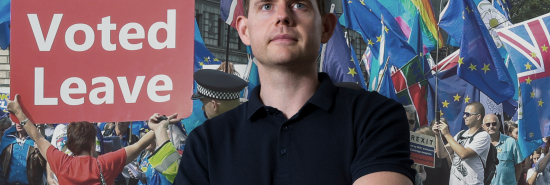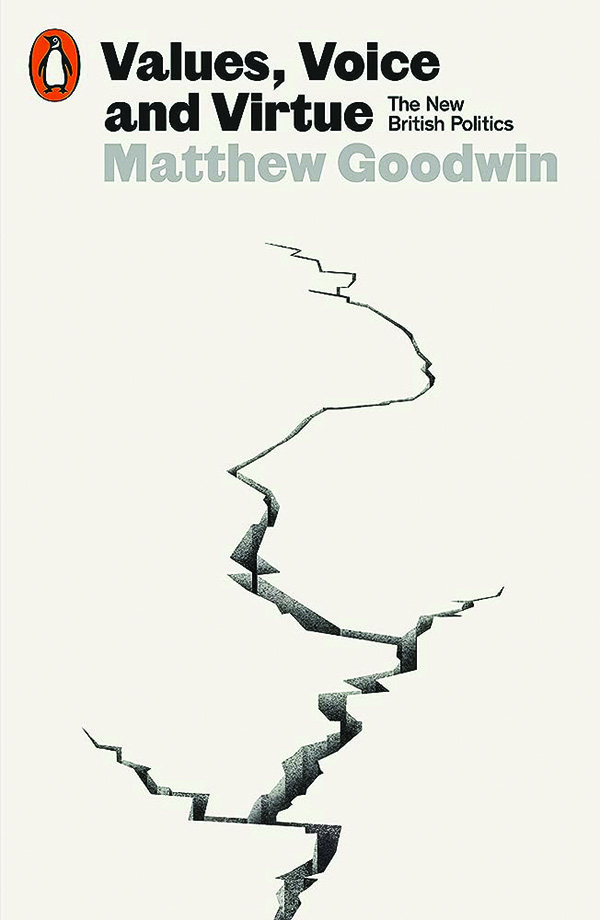
Matthew Goodwin analyzes populism from the inside
Titus Techera
Matthew Goodwin, a British professor who teaches political science at the University of Kent, has spent his career studying populism. And he owes his success to the reluctant admission by English elites that the problem won’t go away. His major demand as a public intellectual is that populism should be understood charitably, reasonably, in an enlightenment mood, and therefore treated with the respect due to any demand by a large number of citizens in a democracy.

Economically, that demand is to become or remain part of the middle class, given the challenges of globalization. Politically, it is to have their views represented by a major party. Goodwin, however, is not merely an analyst of populism among political trends and dynamics. A major new media figure with a big Substack and X following, he has also become the leading intellectual voice for populism in the last decade, with a string of co-authored books that were sometimes far ahead of their time, sometimes topical, always on the topics that are intolerable to elites: Revolt on the Right, UKIP, Brexit, and National Populism. Now, he’s come out with the solo-authored Values, Voice and Virtue. If you want to understand rather than merely quake about the “rise of populism” and see where it comes from and what it portends, his new book is the thing to read.
WITH NO CLEAR PATH TO AVOID A SHUTDOWN, HOUSE REPUBLICANS’ INTERNAL TENSIONS SPEW INTO THE PUBLIC
Goodwin explains British politics now as a conflict between populists, who tend to be the poorer half of Britain, and a “new elite” that concentrates in prosperous cities and dominates public institutions: “This new elite is defined by very different things: their degrees from one of the most prestigious Oxbridge or Russell Group universities; their strong liberal cosmopolitan if not radically progressive cultural values; their increasingly loud and dominant voice in Britain’s most important and influential institutions; and their growing sense of moral righteousness over other groups in British society.”
This should sound familiar to Americans. And while class politics is an ugly thing, it’s much less ugly than what the new elites have to offer, namely race and gender politics. Also, it’s at least manageable for a country, whereas Goodwin further attacks elites for making politics unmanageable by “reshaping [Britain] around a far more disruptive, and divisive, model of ‘hyper-globalization,’ an unprecedented new era of mass immigration, integrating the nation into supranational institutions such as the European Union and hollowing out its national democracy by handing power to a new, more insular, careerist and homogeneous political class in Westminster.” This, too, fits with Republican politics, or at least the Republican electorate, post-2016.
So far, this might not sound like the end of the world, but it is. Another way to look at Goodwin’s career is as the most consistent chronicler of events that have upturned the United Kingdom several times, most famously in the Brexit case. As Goodwin points out, the past several years have been a sort of historical aberration: For times of peaceful prosperity, the period has seen strikingly unstable, even chaotic, English politics.
If we still had intelligent observers of democratic politics, we would be shocked that in England, a successful party, a dozen years in office, has achieved the ruination of four consecutive prime ministers of its own — David Cameron, Theresa May, Boris Johnson, and Liz Truss — by the unusual mechanism of electoral or party victory. (Rishi Sunak is next, by the way.) How can victory equal career suicide? The Tory love of backstabbing leaders, a time-honored tradition, explains part of the problem. Another part is explained by Values, Voice and Virtue: None of them listened to Goodwin!
This sounds cheeky, but it’s true. And it’s of some importance to American readers, too. England, after all, is facing the same problems as America. Popular distrust of government and despair of politicians; fear of crime, social decay, unsafe cities, and out-of-control immigration; prohibitively expensive housing and medical costs; and fear of recession, inflation, and high energy costs. In short, it looks like the ‘70s all over again! Added to these, Goodwin talks about an American problem — “woke” madness, critical race theory, DEI, all this stuff exported to England.
The major reason, then, to read Goodwin is that it will help us understand our problems with a bit of distance while encouraging us to think about the old Anglo-American alliance of Prime Minister Margaret Thatcher and President Ronald Reagan. After the ‘70s came the ‘80s, and not by accident, but by comprehensible political dynamics that could now replay. If we’re going to get any of the politicians we used to contemplate as heroes pulling their societies from misery and self-loathing, we should restore a way of thinking about politics in terms of populism — that is, an attack on an irresponsible elite in the name and with the support of a democratic majority.
This leads Goodwin to the much stronger claim that we are now undergoing a transformation into something of a scientific tyranny, or at least a tyranny of the university-educated who claim ownership of science. British elites value different things than most Britons. They are in the habit of denying the people a voice in either culture, media, or politics since they don’t enjoy dissent, and they take that censorship so seriously because they believe they have a monopoly on virtue.
Accordingly, Goodwin’s guide to the problem is in two parts, opening with two chapters on the new elite and its revolution and moving on to three chapters on values, voice, and virtue. The intention, as per his conclusion, is to suggest to people a counterrevolution, a return to more “unifying narratives” that affirm the equal rights of all citizens.
Aside from the attraction of timeliness, the volume has further charms. It’s written with a very English reasonableness, avoiding scandalous phrases. Much of the volume is a gentle but firm disproving of the fantasy that social media somehow created, possibly out of thin air, our current revolt against the elites. The phenomenon is very real and has been coming for a long time. Goodwin points out that electorates are far ahead of their parties or supposed leaders, and much of our confusion comes from the fact that we fight wars of words instead of dealing with the electorate, either by gathering data or just listening to what people say. His attempt is to return political opinion to a role closer to describing events and attitudes, less fantasizing about what other worlds we might like better than the one we inhabit. That used to be called common sense, and there is much to recommend it as an antidote against the madness of our times.
CLICK HERE TO READ MORE FROM THE WASHINGTON EXAMINER
Titus Techera is the executive director of the American Cinema Foundation and a cultural critic.
